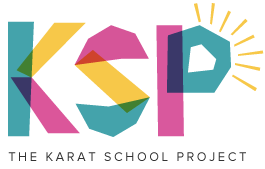Seeds of Empowerment: Transforming Lives Through Education & Sustainable Farming
I’m Evelyne Keomian, Founder and Executive Director of The Karat School Project (KSP). My goal as a social entrepreneur is to help the girl I once was by providing the element that I was denied access to but changed my life: education.
In 2016, I returned to my home country, Côte d’Ivoire, and conducted on-the-ground research to better understand what was behind the increased number of children, especially girls, working as street sellers and child laborers. I knew about the deeply entrenched cultural beliefs that discourage girls’ education, but after learning from a mother that her daughter earned more money than her older son, I better appreciated the economic barriers to girls’ education. When we launched our free, full-time, state-of-the-art education center in 2018 and only 18% of students were girls, I worried that free education wasn’t enough to bridge the education gap. That’s when I read Melinda Gates' book, The Moment of Lift: How Empowering Women Changes the World, and learned about Oportunidades, a Mexican government program that pays families to keep their children in school.
Inspired by that example, the Karat School Project worked with local groups of women in Cote d’Ivoire to better understand the challenges that limit their well-being and future and that of their daughters. Then in 2022, we launched the Girls' Education Incentive Farming Program with seed funding from Rotary International thanks to the Los Altos Rotary Club.
The program provides a stipend to mothers who keep their girls enrolled at the Karat School while they learn financial literacy and sustainable farming skills.
Financial Empowerment/Power Building
Although farming is in the name, teaching financial literacy is a major component of the program. Lack of financial independence is one of the most widespread forms of oppression faced by women. To help mothers turn their monthly stipend into a source of ongoing financial independence, we created a Giving Circle. Participating mothers are encouraged to pool their money and save it while they learn how to use it effectively. They learn accounting, budgeting, and investment skills and how to obtain loans. After learning these skills, mothers are encouraged to invest the capital they have accumulated over the course of the program. Many graduates of the program have now opened bank accounts for the first time, and some have even qualified for microcredit.
Sustainable Community Farming
I am proud of the work we have done to make mothers financially savvy, but I want women to be more than independent or even entrepreneurial. I want to see women take the lead in improving their communities and tackling problems facing the world. That is why the centerpiece of the program is sustainable farming.
To facilitate this goal, the KSP purchased 4 hectares (7 acres) of land for mothers to farm. The participants decide as a group which plants they want to grow, and the school provides the seeds. During the six-month program, participating mothers are taught modern and local/traditional methods of climate-conscious farming, including biointensive and regenerative farming techniques and soil preservation methods. This past year, our farming mothers produced 500 kilograms of food from 7 different crops, including rice, beans, and okra. Thanks to the efforts of these mothers, more food is in our community and KSP can give its students 2 meals a day that are cheaper, fresher, and healthier than what we would have bought for them.
Women, particularly African women, are disproportionately impacted by both food insecurity and climate change, but they can also take a leading role in addressing these problems locally and globally. KSP works to make this possible by giving mothers the knowledge to nourish themselves, their children, and their communities in a way that protects the environment they share.
A Grassroots Approach to Human Rights
Education empowers people to improve their lives, their communities, and the world. That’s why the Girls Education Incentive Farming Program doesn’t tell mothers what they need but gives them the tools to lead. They decide what crops to grow, and they decide where their money goes. They make decisions and achieve goals as a team. In the classroom, we teach girls to be the leaders of tomorrow but with the Girls Education Incentive Farming Program, we also enable women to be leaders today. When I watch the mothers of daughters make a difference for themselves, their children, their communities, and the world, I couldn’t be more proud of the work we do at the Karat School Project.
Barbara Weinstein, Editor
Spencer Penn Merritt, Writing intern



